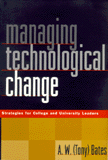Managing Technological ChangeStrategies for Academic Leaders
|

|
 Diese Seite wurde seit 18 Jahren inhaltlich nicht mehr aktualisiert.
Unter Umständen ist sie nicht mehr aktuell.
Diese Seite wurde seit 18 Jahren inhaltlich nicht mehr aktualisiert.
Unter Umständen ist sie nicht mehr aktuell.
 Zusammenfassungen
Zusammenfassungen
 Implementing new technology at a college or university requires more than simply buying new computers and establishing a web site. The successful use of technology for teaching and learning also demands major changes in teaching and organizational culture. In Managing Technological Change, Tony Bates - a world-renowned expert in the use of technology in university teaching - provides practical, systematic strategies for creating the new, technologically competitive academic organization.
Implementing new technology at a college or university requires more than simply buying new computers and establishing a web site. The successful use of technology for teaching and learning also demands major changes in teaching and organizational culture. In Managing Technological Change, Tony Bates - a world-renowned expert in the use of technology in university teaching - provides practical, systematic strategies for creating the new, technologically competitive academic organization. Drawing on recent research and best practice case studies - as well as on his thirty years of experience in using technology for teaching - Bates provides a wide range of strategies for managing change to ensure the successful use of technology. He suggests strategies for winning faculty support for teaching with technology, and provides advice on appropriate decision-making and reporting structures. Other topics covered include reward systems, estimating costs of teaching by technology, and copyright issues. And he details the essential procedures for funding new technology-based systems, managing the technology, and monitoring its ongoing educational effectiveness in anticipation of future changes. Throughout the book, Bates maintains a focus on the human factors that must be addressed, identifying the risks and penalties of technologically based teaching and showing how to manage those risks.
Managing Technological Change is a blueprint for creating the university or college of the future - a timely, nuts-and-bolts guide to changing strategies for the leaders of campuses undergoing technological transformation.
 Dieses Buch erwähnt ...
Dieses Buch erwähnt ...
 Begriffe KB IB clear |  Copyright Copyright Copyright
, Copyright
,  E-Learning E-Learning E-Learning
, ICTICT
, E-Learning
, ICTICT
,  Lernen Lernen learning
, learning
,  Management Management management
, management
,  Schule Schule school
, school
,  Technologie Technologie technology technology
|
 Dieses Buch erwähnt vermutlich nicht ...
Dieses Buch erwähnt vermutlich nicht ... 
 Nicht erwähnte Begriffe | Bildung, Kinder, LehrerIn, Unterricht |
 Tagcloud
Tagcloud
 Zitationsgraph
Zitationsgraph
 Zitationsgraph (Beta-Test mit vis.js)
Zitationsgraph (Beta-Test mit vis.js)
 Zeitleiste
Zeitleiste
 12 Erwähnungen
12 Erwähnungen 
- Kosten und Nutzen des E-Learning an der Fachhochschule (Urs Gröhbiel)


- Entwicklung internetgestützter Lernprogramme - Dissertation (Urs Gröhbiel) (2001)


- E-Learning im Unternehmen - Grundlagen - Strategien - Methoden - Technologien (Andrea Back, Oliver Bendel, Daniel Stoller-Schai) (2001)

- Digitaler Campus - Vom Medienprojekt zum nachhaltigen Medieneinsatz in der Hochschule (Michael Kerres, Britta Voß) (2003)



- The introduction of eLearning in European universities - models and strategies

- The introduction of eLearning in European universities - models and strategies
- Supportstrukturen zur Förderung einer innovativen eLearning-Organisation an Hochschulen - SCIL-Arbeitsbericht III (Ingrid Schönwald, Dieter Euler, Sabine Seufert) (2004)


- E-Learning in Hochschulen und Bildungszentren - Gestaltungshinweise für pädagogische Innovationen (Dieter Euler, Sabine Seufert) (2004)


- Why Faculty Did - and Did Not - Integrate Instructional Software in Their Undergraduate Classrooms (Timothy Weston) (2005)

- Didaktische Überlegungen und Einsatzszenarien zur Implementierung von eLearning in der Hochschullehre (Michael Kerres, Axel Nattland, Jörg Stratmann) (2005)

- E-Learning - Alltagstaugliche Innovation? - 11. Europäische Jahrestagung der Gesellschaft für Medien in der Wissenschaft GMW (19.-22.9.06) (Eva Seiler Schiedt, S. Kälin, Christian Sengstag) (2006)

- Mobility Matters - E-Learning auf Hochschulebene integrieren (Koni Osterwalder, Iwan Stössel)
- The Strategic Management of E-Learning Support - Findings from American Research Universities (Franziska Zellweger Moser) (2007)

- Pädagogischer Mehrwert und Implementierung von Notebooks an der Hochschule (Jörg Stratmann) (2007)

 Co-zitierte Bücher
Co-zitierte Bücher

Nachhaltigkeit von eLearning-Innovationen (SCIL-Arbeitsbericht II)
Ergebnisse einer Delphi-Studie
(Sabine Seufert, Dieter Euler) (2004)



Nachhaltigkeit von eLearning-Innovationen (SCIL-Arbeitsbericht I)
Ergebnisse einer Expertenbefragung
(Sabine Seufert, Dieter Euler) (2003)


Supportstrukturen zur Förderung einer innovativen eLearning-Organisation an Hochschulen
SCIL-Arbeitsbericht III
(Ingrid Schönwald, Dieter Euler, Sabine Seufert) (2004)

 Bibliographisches
Bibliographisches 
 Beat und dieses Buch
Beat und dieses Buch
Beat war Co-Leiter des ICT-Kompetenzzentrums TOP während er dieses Buch ins Biblionetz aufgenommen hat. Zum letzten Mal hat er dieses Buch bearbeitet während seiner Zeit am ICT-Kompetenzzentrum TOP. Beat besitzt weder ein physisches noch ein digitales Exemplar. Aufgrund der wenigen Einträge im Biblionetz scheint er es nicht wirklich gelesen zu haben.













 Biblionetz-History
Biblionetz-History